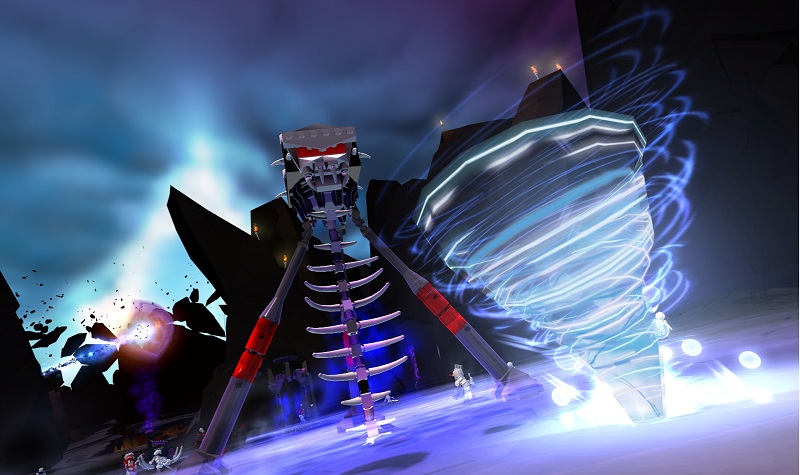Writing a regular opinion column can involve feast or famine-type situations with respect to topics that interest me enough to comment on. Fortunately, the MMOG industry and the free to play sector are busy enough that latter seldom happens. Since last time, quite a few things caught my attention, including the sampling below. As you'll see, a number of them left me with questions.
Lineage II Goes Free To Play
Although I've yet to see a specific date, NCsoft revealed last week that Lineage II will shift over to F2P "later this year". The announcement only covers the North American servers, but I find it impossible not wonder what will happen in Europe. Could it just be a matter of time until we see a similar move there?
Beyond that, could the company also be contemplating such a change in Korea? It may not be a monumental leap to think so, especially if, as seems likely, major decisions such as switching business models in this region have to be approved if not actually made by the head office.
In addition, NCsoft will announce a major new game this week. Speculation has arisen in some quarters that it might be the latest iteration of the long-awaited Lineage III. While G-STAR does provide an obvious occasion for Korean publishers to unveil significant projects, would the company risk over-shadowing Blade & Soul before it has launched? I guess we'll see soon enough.
Rift to Be Subscription in Korea
Preceding the first public showing of the localized Korean version at G-STAR later this week, CJ Entertainment, which will publish Trion Worlds' game there via its popular Netmarble portal, announced that its closed and open betas will take place in Q1 and Q2 of next year respectively. The company also confirmed it will be subscription-based, although without giving any details.
While this wasn't a big surprise, some observers, myself included, have been wondering if converting to F2P would improve the game's chances of success. Western-made MMOGs have a less than sparkling record in Korea to begin with. Will using the business model that is less popular there constitute an additional obstacle? It seems possible, perhaps even probable, since the market balance as a whole seems to be trending in that direction.
Dark Millennium Online to Have “Flexible” Model
According to a story at GamesIndustry.biz, THQ is keeping its options open for its Warhammer 40K MMOG, which is currently slated for 2013. This apparently means it will be able to use different approaches on a region by region basis. Does this mean the company is leaning toward subscription in North America and Western Europe along with F2P in the rest of the world?
The piece also says the game's budget is at least $50 million, which leaves no question it's a major undertaking. So, if the regional scenario above is what ends up happening, will it make John Smedley's prediction regarding no more big subscription-based titles right or wrong?
LEGO Universe Shutting Down
The news from Lego late last week was that its youth- and child-oriented MMOG will go offline at the end of January 2012. The game, which added a limited F2P option just a few months ago, apparently failed to generate enough converts to its subscription program. More than 100 jobs will be lost; developer Play Well Studios will close, as will a marketing division in Denmark.
I'm rather curious to see where the fingers will be pointed. From the time it was announced, I felt a Lego MMOG could make a mark in the industry. That said, I learned long ago that there are far more good ideas than successful implementations thereof. In this respect, I'm not just talking about game quality, but also about generating enough visibility with an appropriately chosen core target audience to build a solid, differentiated and sufficiently appealing brand image. My gut tells me that multiple factors contributed to this not happening; i.e. that attributing it to one cause, as some people already have, is too simplistic.
The Layoff Beat Goes On
Reports surfaced last week that Gameforge is restructuring, with about 100 people losing their jobs in the process. This number is said to represent nearly a quarter of the German-based publisher's workforce. In addition, Mythos and Hellbreed have been cancelled, and Star Trek: Infinite Space is on the bubble unless a co-publisher is found. The company is a leader in the browser-based sector, and also owns Frogster, which it acquired last year.
An obvious question here is whether Gameforge tried to grow too quickly. Such a scenario is certainly plausible. The web-based market is definitely competitive, with a comparatively low barrier to entry, so maintaining a large market share, never mind growing it, is no easy task. This might have led to revenue projections that proved too optimistic to support both the acquisition and expanded development activity that must have included at least some licensing fees.
This comes on the heel of recent news that Earth Eternal is in difficulty again, and that Troy Online, which launched a few months ago, will discontinue service at the end of this month, albeit ALT1Games says this is a temporary measure to fix quality issues. Also within just the past two weeks ago, word surfaced about an undisclosed number of layoffs at NCsoft as well as 30 or so at GamersFirst.
All in all, quite a few negative reports in the short span since my last column. Is this merely a coincidence, or does it suggest the market isn't growing rapidly enough to support the rate at which games are being developed? All I can do is hope it's the former, and that the next two weeks bring a more upbeat range of news.





